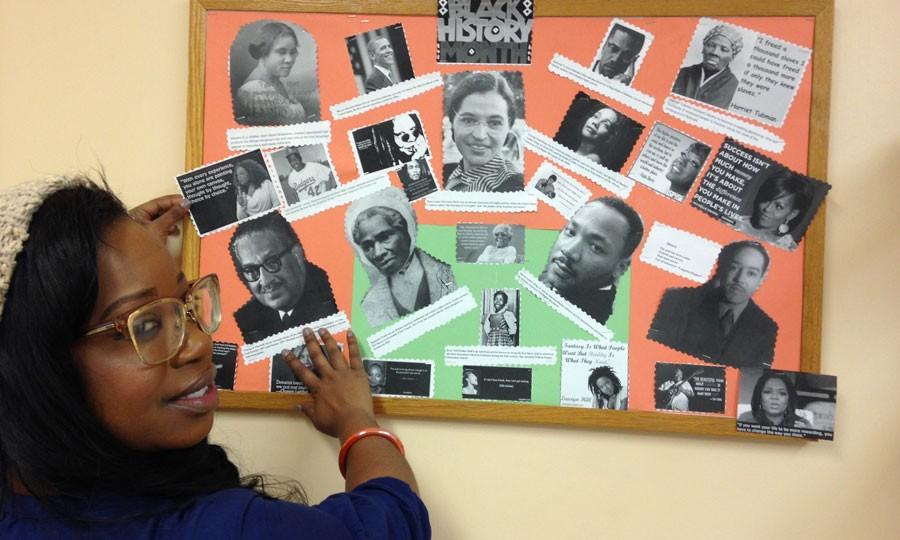Celebrating Black History Month
Maria H., an employee at NHS is pictured with a Black History Month collage that she created for a classroom activity.
The month of February spotlights events such as Valentine’s Day and President’s Day sales at retail stores, but many celebrate this month by recognizing the role of African Americans and their achievements throughout United States history. This special tradition derived from “Negro History Week”, which was first started by Carter G. Woodson, in 1926, and has been continued by other prominent African figures throughout history. The week was originally chosen to coincide with the birthdays of President Abraham Lincoln on February 12 and Frederick Douglass on February 14. Since 1976, every President of the United States has officially designated the entire month of February as national Black History Month. The devotion of celebrating Black History in the U.S. during February has since spread to other countries such as Canada and the United Kingdom.
When you think of famous people in Black History, the names of Martin Luther King Jr., Malcolm X, and Harriet Tubman immediately come to mind, but there are plenty of other influential and historic figures that the history books tend to overlook. For example, Benjamin Banneker (1731-1806) was an astronomer who made precise calculations that predicted solar and lunar eclipses. William H. Carney (1842-1908) was a Civil War hero and the first African American to receive the Medal of Honor. Madame C.J. Walker (1867-1919) was the first woman of any race to become a millionaire with the founding of her hair care and cosmetics company.
The original idea behind instituting a Black History month was to encourage and educate all people about the contributions African Americans have made towards our country’s history. The subject is not without criticism and often sparks debates about it’s importance in today’s society. Many people, both black and white, have passionate opinions about the fairness or purpose of Black History month. There are those who argue that “Black” History is “American” History and should not receive any special recognition. Of course, in matters such as this, racism always plays a major role. There are many people who will always be filled with hate and refuse to acknowledge those who are different from them.
So, is Black History Month still important? That all depends upon who you ask. Black celebrities like Oscar winning actor Morgan Freeman and actress Stacey Dash have been openly critical about it’s usefulness. There are many other black leaders like Henry Louis Gates Jr. and Rev. Michael Joseph Brown who feel that it serves a very important purpose and should never go away. Padua Freshman Naja McCain says, “My family enjoys February as being National Black History Month. Although we don’t overly celebrate this event, my family occasionally visits a museum that features a lot of my race’s achievements.” McCain stated, “I believe that it is very important to the rest of America. Although many people may not appreciate it, it is great to flashback and remember all of the exceptional achievements that many U.S citizens have accomplished no matter what race.”
It’s certainly important that we as a nation remember the achievements and contributions of African Americans throughout our history. Awareness needs to be raised about the challenges and sacrifices and ultimately the determination of African Americans; however, there are those who feel that a month designated to honor the accomplishments of African Americans is not appropriate or even necessary. Those opinions are not always based on racial attitudes or ignorance. But until the day comes when all Americans learn to appreciate and accept each other, the need to promote equality and social justice will continue for people of all races and nationalities. Perhaps there will be a day, sometime in the future, where the idea of having a Black History Month won’t be necessary and will be just that, history.

Sydney K. '19 is passionate, aspiring young writer. She's currently a freshman at Padua Academy and is an eager and determined athlete who always strives...















